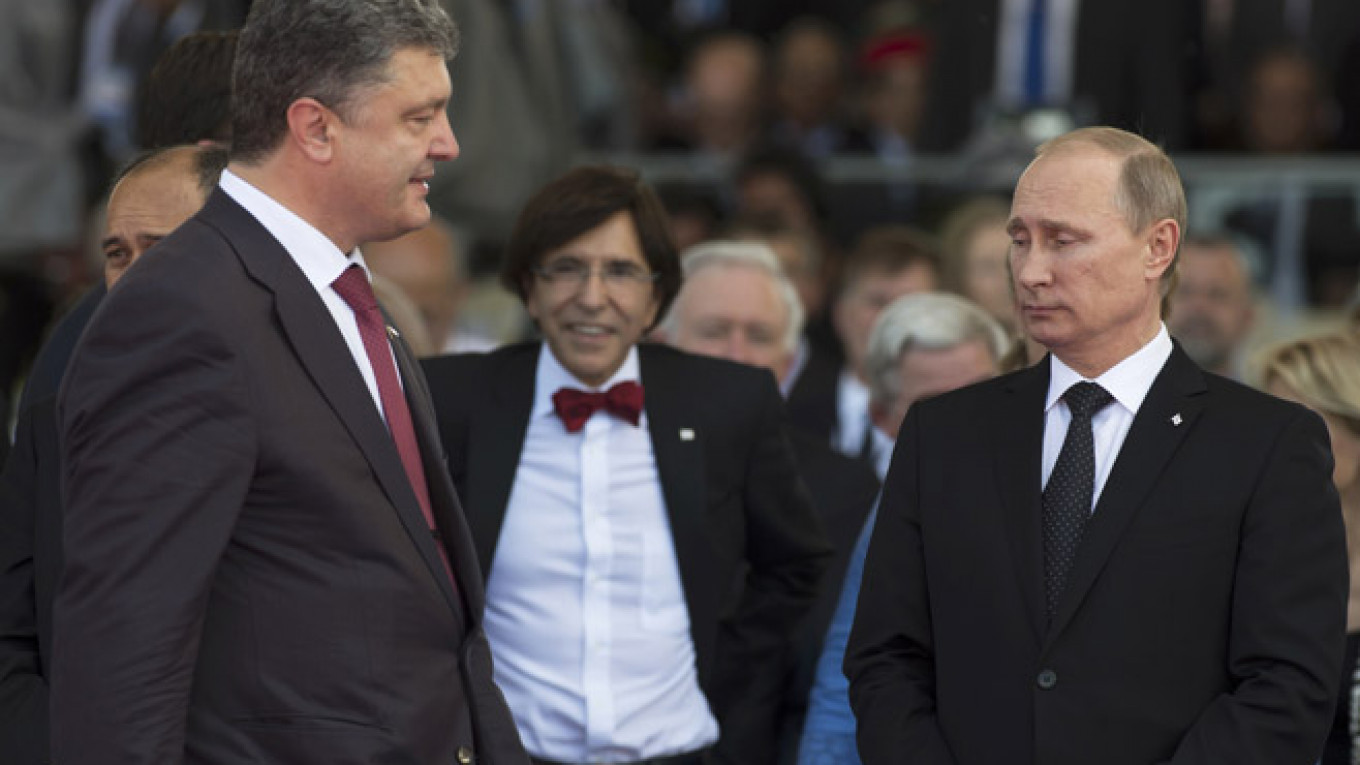Russian Foreign Minister Sergei Lavrov berated his Ukrainian counterpart Andriy Deshchytsia on Monday for publicly insulting Russian President Vladimir Putin, though political analysts said the barbs exchanged would not significantly affect the already sour diplomatic relations between the two countries.
Lavrov and other Russian officials have denounced Ukraine's acting foreign minister, Deshchytsia, who called Putin a "dickhead" in Ukrainian during a disorderly protest outside the Russian Embassy in Kiev on Saturday.
Speaking in Minsk at a press conference Monday, Lavrov said he had "nothing more to talk about" with Deshchytsia, suggesting that the already tense diplomatic relations between the countries might have reached a new nadir.
Lavrov, who is himself notorious for his expletive language, said his Ukrainian counterpart was an "outcast for Russia" and that "if he cannot stand the heat, he should get out of the kitchen."
Prime Minister Dmitry Medvedev added to Lavrov's comments, saying Monday that Deshchytsia's behavior was "completely inappropriate."
Both Russian and Ukrainian political analysts say that these sharp-tongued exchanges are a manifestation of the dire state of political and economic tensions between the countries, but that they do not have the potential to sever diplomatic ties.
"There is a big difference between ignoring a politician [Deshchytsia] and severing diplomatic ties," said Alexei Makarkin, deputy director of the Moscow-based Center for Political Technologies think tank. "Going back a few years, we may recall that the Russian authorities actively ignored former Ukrainian President Viktor Yushchenko. Relations at the time were sour, but diplomatic relations were not cut. We are facing a similar situation now. Severing diplomatic ties is not an option for either Russia or Ukraine."
Tensions between the two countries were especially high over the weekend after pro-Russian separatists downed a Ukrainian military airplane in Luhansk on Saturday, killing all 49 people on board. Despite the Kremlin's repeated denial of its ties to pro-Russian separatists in Ukraine, NATO and Washington have continued to accuse Russia of supplying military equipment to fighters in eastern Ukraine, a suspicion that sparked the protest at the Russian Embassy in Kiev.
Ukrainian political scientist Mykhailo Pogrebinsky, head of the Kiev Center for Political and Conflict Studies, agreed that the spat over Deshchytsia, who was appointed acting foreign minister after Ukraine's recent regime change, will not have a profound effect on Russian-Ukrainian relations.
"Deshchytsia will most likely be removed from his position, but this would have happened even without the latest incident," Pogrebinsky said. "It is clear that channels of communication have long been blocked between Deshchytsia and Russian authorities. The only thing this incident does for Deshchytsia is buy him a few more days in office, given that Ukraine will not want his dismissal to appear to be the result of Kremlin pressure."
Alexei Pushkov, the outspoken head of the State Duma's International Affairs Committee, urged Moscow to appeal to newly elected Ukrainian President Petro Poroshenko to have Deshchytsia dismissed.
Ramzan Kadyrov, the outspoken and Kremlin-loyal Chechen leader, weighed in on the discussion Monday, using his preferred platform – the social networking site Instagram – to call for Deshchytsia's immediate resignation.
“Deshchytsia insulted all the Russian people, all of mighty Russia, and he will have to answer for that,” Kadyrov wrote.
He should “get down on his knees and ask for forgiveness,” the Chechen leader added.
"Poroshenko should change his foreign minister. He does not control himself very well," Pushkov wrote on his Twitter account on Sunday, condemning the U.S. ambassador in Kiev, Geoffrey Pyatt, for calling Deshchytsia a "skilled diplomat."
Poroshenko had been expected to name a new foreign minister in the upcoming days. The names of Pavlo Klimkin, Ukraine's ambassador to Germany, and Valery Chaly, who was in charge of foreign policy issues during Poroshenko's presidential campaign, have circulated in Ukrainian media as potential candidates to replace Deshchytsia.
"Russia might not want to work with Deshchytsia after this incident," Makarkin said. "But Deshchytsia's words won't prevent Russia from working with his replacement."
See also:
Relations Chill as Ukraine Suspects Russia of Sending Rebels Tanks
Contact the author at g.tetraultfarber@imedia.ru
A Message from The Moscow Times:
Dear readers,
We are facing unprecedented challenges. Russia's Prosecutor General's Office has designated The Moscow Times as an "undesirable" organization, criminalizing our work and putting our staff at risk of prosecution. This follows our earlier unjust labeling as a "foreign agent."
These actions are direct attempts to silence independent journalism in Russia. The authorities claim our work "discredits the decisions of the Russian leadership." We see things differently: we strive to provide accurate, unbiased reporting on Russia.
We, the journalists of The Moscow Times, refuse to be silenced. But to continue our work, we need your help.
Your support, no matter how small, makes a world of difference. If you can, please support us monthly starting from just $2. It's quick to set up, and every contribution makes a significant impact.
By supporting The Moscow Times, you're defending open, independent journalism in the face of repression. Thank you for standing with us.
Remind me later.






